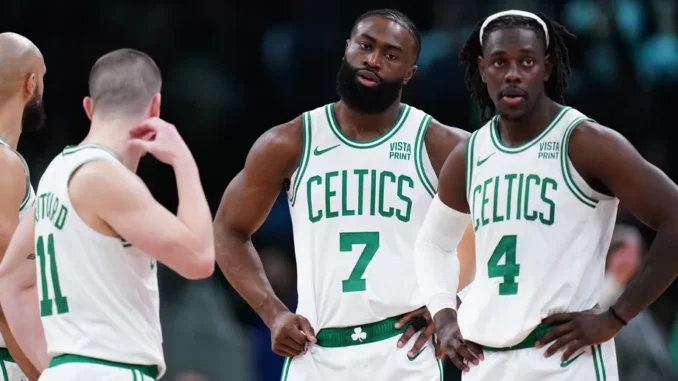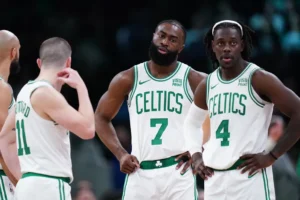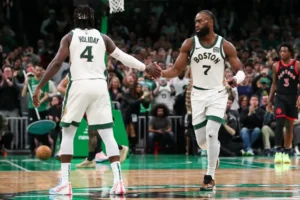
Future salary cap limitations may need the Celtics front staff to make some difficult choices.

According to The Ringer, rival executives believe that Jaylen Brown and Jrue Holiday may prove to be too costly for Boston.
For the past three seasons, the Boston Celtics have been among the best teams in the league. They sit comfortably six games ahead of second place in the Eastern Conference this season. As long as their top-6 players are available, the guys in green should be regarded as the clear favorites to win the championship.
Why then are we discussing trades?

Howard Beck of The Ringer claims that several elite clubs may soon have to face the consequences of their salary caps. Next season, the new CBA will be completely implemented, and teams who make more than the second salary apron will face harsh penalties. In addition to the increased obstacles to team-building (such as the elimination of free agent exceptions and the prohibition on salary aggregation in trades), teams that fail to reach the apron three out of five years will have their future first-round picks locked (and eventually relocated to the end of the round).
This year and going forward, the Celtics anticipate being past that phase. Fortunately, there is a “bonus” season this year before those penalties apply.
But going forward, Brad Stevens, President of Basketball Operations, will need to strike a balance between potential sanctions and championship hopes.
Even if they were to win the championship, it would be difficult to retain Jayson Tatum, Jaylen Brown, Kristaps Porzingis, Jrue Holiday, and Derrick White forever, according to Beck. “Is it necessary to let go of a gifted role player like Holiday?”
Most likely, the answer to Beck’s query is “no.” Holiday is expected to earn $35 million this season, with a $37 million player option for the next one. The most likely scenario for that looming option is that he declines it in favor of a two- or three-season extension that would pay roughly $30 million annually. Boston would probably gladly pay that for their defensive main man. Furthermore, in the event that management anticipated a future improvement, that contract would be movable.
A few circumstances might cause that computation to vary. If Holiday has greater demands than that, he will almost certainly have to leave, either by choosing to enter the league without an extension plan, which would likely force Boston to look for a trade partner, or by declining his player option to become a free agency. Holiday has just stated that he is fully committed to completing an extension, though. Cross your fingers.
If Boston struggles in the postseason, they might pursue Holiday in a different way. If everyone remained healthy, it would need to be an extremely severe collapse to demonstrate that this was not a championship squad. That is unlikely.
An NBA executive who is Beck’s source believes Boston needs to “figure out who’s expendable and who’s not.”
“Not yet,” I respond to that.
Nothing will stop the Celtics from winning it all again the following season. Once Jaylen Brown’s agreement takes effect, Boston’s cap sheet does so as well, but it simply makes it more difficult to sign higher-paid free players and execute midseason transactions. Teams with competitive rosters don’t need to do as much of it.
Only Luke Kornet, Svi Mykhailiuk, Xavier Tillman, Oshae Brissett (player option), and Holiday (player option) have the potential to leave Boston as free agents this summer. Only Holiday is a genuinely essential member of the rotation among those players.
Read more on sportupdates.co.uk

Leave a Reply